Ellen and Jim Have a Blog, Too
We are two part-time academics. Ellen teaches in the English department and Jim in the IT program at George Mason University.


Pallisers 7:13: The Lizzie matter: the hollow spoiled child-woman · 13 July 08
Dear Friends,
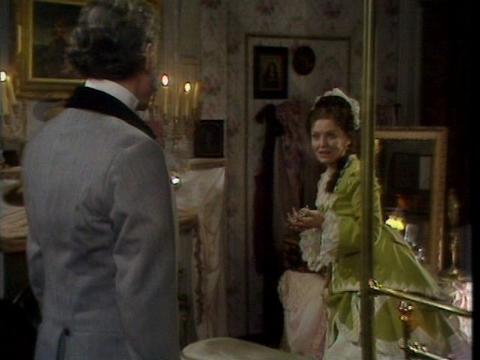
A rare moment of non-hypocrisy for Lizzie; she lets down her guard (Episode 23, Scene 18, below)
This is the one part almost wholly devoted to the Lizzie matter—which I now think is an accurate title for what Raven turns Trollope’s Eustace Diamonds into. We have 1 Phineas and Mary scene, 2 scenes from Matching Priory as chorus, and the 1 in Madame Max’s apartment which focuses on Fawn; the rest of 7:13 is all Lizzie matter.
The third central story matter of the Palliser films consists of Lizzie Eustace at the center of a group of characters, one of whom, Lord Fawn (Derek Jacobi), also attempts to interact with a figure, Madame Max (Barbara Murray), all along connected strongly to the Pallisers as a group and Phineas Finn (Donal McCann). One character, Frank Greystock (Martin Jarvis) is a kind of fragment of Trollope’s Eustace Diamonds or remnant deprived of all the characters he was embedded in in Trollope’s novel (except Lizzie), and the fragmentary feel of this character shows just how much characters in a novel come to us as a product of their interactions with other characters they occur with.
And three hangers-on: two are presented more sympathetically than in Trollope, Lord George de Bruce Caruthers (Terence Alexander) who when we first meet him expresses (if selfishly) a concern with how the trains operate (the only one of the band to have a view of anything beyond himself) and Mrs Jane Carbuncle (Helen Lindsey) who is Lord George’s weary mistress and plays a sort of corrupt mother role in her scenes with Lizzie, here infantilized even more than Lady Glen (Susan Hampshire) when the series opened (1:1). Lord George too acts like a kindly wise, but also indifferent surrogate father to Lizzie.
Finally, there’s Mr Joseph Emilius (Anthony Ainley), not called Jewish here, but presented as utterly slimy, a hypocrite so low that he will begin an affair and even marry Lizzie Eustace (that’s how desperate and amoral he is). Trollope’s scorn for the archetype of the femme fatale and for any admiration for Becky Sharp may be said to have been done justice to when we get to Lizzie and the Rev. Emilius on the couch and have a fade out (towards the end of 7:14).
As to 7:13, I suggest one could see it as another part where we have a continuum of women (an earlier one was Pallisers 2:3: “The Splendours and Miseries of Courtesans”). This time the center is a hollow utterly self-centered spoiled child-woman. The continuum we were given in Eustace Diamonds, one which could be read a proto-feminism is erased: no Lucy, no Lucinda, no Miss MacNulty, no Lady Linlithgow, Lady Fawn transformed from the good woman helping Lucy to the ironic mother of the Fawns (Madeleine Christie). Instead our continuum is of dominant women with varieties of emasculated men: the women consist of a bully, Clara Hittaway (Penelope Keith), an alluring, sexually available, and rich liar (Lizzie), casual alcoholic but good-natured mistresses (Mrs Carbuncle) and good (Madame Max, Barbara Murray, and Mary Finn, Maire Ni Ghrainne) if misguided (Lady Glen) women, who sacrifice themselves for the comfort of their men.
The men who count are the dying and salacious trivializer, the Duke of Omnium (now under the thumb and cared for by Lady Glen and Madame Max), Lord Fawn, Frank Greystock, Mr Emilius, Lord George, and Andy Gowran (Lizzie’s steward, Leonard Maguire). Plantagenet Palliser (Philip Latham) functions as part of a chorus, a messenger from London, rather like Dolly Longstaffe (whose letters are read aloud by Lady Glen, so no Donald Pickering to be felt), who tells us truths. The world of important action is elsewhere; the story of Lizzie is an interlude to them, and only important as entertaining the Duke who is a major connecting presence in the Part. In Trollope’s ED the Duke does utter the penultimate sentence on what’s in store for Lady Eustace (Trollope does not so incessantly call her Lizzie): he tells Lady Glen: ”’I’m afraid, you know, that your friend hasn’t what I call a good time before her, Glencora’” and Trollope’s narrator concurs (Ch 80, p 770).
I now turn to a summary of the episodes of 7:13:
Episode 21: “Journey to London:” Scene 1) Outside Portray, at the castle door. A man in black knocks hard (ominous) and has a letter so offficial looking, it frightens Andy Gowran, who looks through the gate worriedly; Scene 2) Outside Portray, another parapet (there was one at Loughlinter Phineas stood on with Violet Effingham [Mel Martin], and had a love tryst 5:9). This time we see Frank giving his hand to Lizzie as Andy excitedly runs hurried down the stairs to tell them of summons from Edinburgh, and we see Lizzie’s at once scornful cavalier attitude towards the law (she affects to dismiss the document’s importance) and immediate turning to Frank to deal with it.
Lizzie’s posturing is a lie; below the surface is a tenaciously selfish dense animal amused by momentary trivial frivolities. Jarvis projects a sudden desperate melancholy as he has earlier projected a kind of skulking gentlemanliness when we first saw him, an air of bravado not accompanied by any sense of strength:
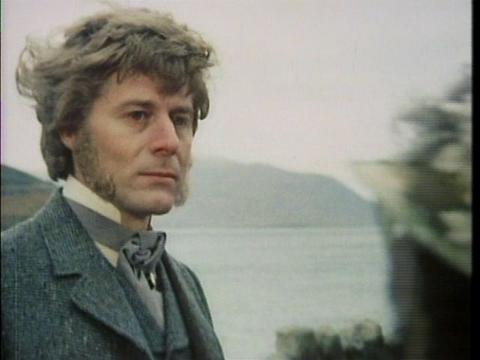
Frank (Martin Jarvis) taken aback
A picture is worth a thousand words. The actor has transcended both script and Trollope’s novel (where we are not quite shown why Frank should return to Lucy when he prudently and disgustedly drops Lizzie). The sense of this moment is of sudden alienation as the man realizes he’s been taken for what he will give based on lies; he will return to a woman character we never see (Lucy Morris) whom he will characterize in 7:14 as “at least honest,” someone who will not dump trouble he can’t deal with on his back. In Raven’s film Frank finds he is just another convenient can for Lizzie Eustace to throw things in or at or a transitory lover to pass the time in bed or on a couch with.
Scene 3) Inside Portray castle, the front room (we see the same one in all the parts). Frank explains to Lizzie that she can be thrown in prison for contempt if she does not show up; they are interrupted by Mr Emilius and then Sir George and Mrs Carbuncle, and while at first Frank tries to separate Lizzie from them and urges Lizzie to travel alone and kick them out, Frank soon sees that without them, she would not get herself to London, and he ends up relying on Sir George to see that she comes and understanding that she will stay with Mrs Carbuncle (for lack of any character of her own for real to chose a place for herself)
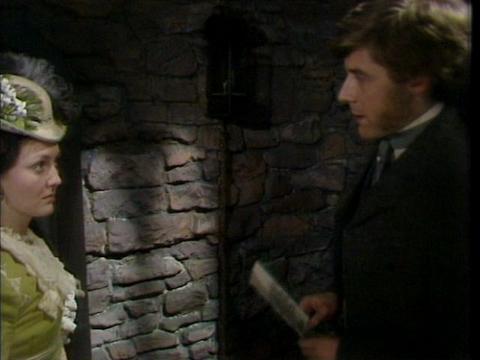
Frank realizing what a burden Lizzie is
When Frank goes up the stairs in considerable irritation, Lizzie hestitates and then like a little girl runs after him. Scene 4) Inside Portray Castle, Lizzie’s bedroom. Opening segment with Crabstick, we see Lizzie’s arrogance, coldness and disdainful way of treating Crabstick who is dismissed, but not before she has watched Lizzie puzzling over the key to the box. A hard look on Crabstick’s face suggests Crabstick’s alienation. Mrs Carbuncle comes in and we have an equivalent of a mother-daughter scene, with Lizzie playing the naughty stubborn child and Mrs Carbuncle soothing her, Lizzie, a wayward daughter, with Mrs Carbuncle posing as her mother.
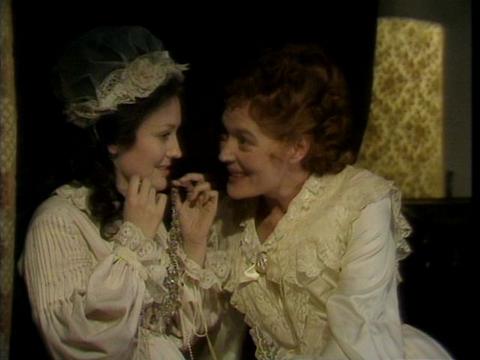
Mrs Carbuncle (Helen Lindsey) playing mother to Lizzie
She again advises Lizzie to sell the diamonds when she can (for they might be stolen at any moment), but Lizzie clutches the stones to her (an image of naivete and greed).
Scene 5) On the train. Raven now returns to Trollope’s ED to take theatrical material from Ch 45 (ED, Penguin English library, 1973, ed SGill and JSutherland, pp. 449-50). Emilius there as a sycophant saying smooth platitudes (“Very expensive bauble …”). Sir George dominates with his mixture of self-possession, and common sense, the latter of which is echoed by Mrs Carbuncle:
George: “They are of no real value.”
bq. Mrs Carbuncle (drinking liquor from a flask): “You can’t eat or drink diamonds”
This view of them is close to Trollope’s narrator’s own, and, if for a moment we put aside how jewels function to enable a man to mark a woman as his (which Lizzie remembers as she tirelessly repeats the story of how her “beloved” husband gave them to her), an accurate assessment of the situation.
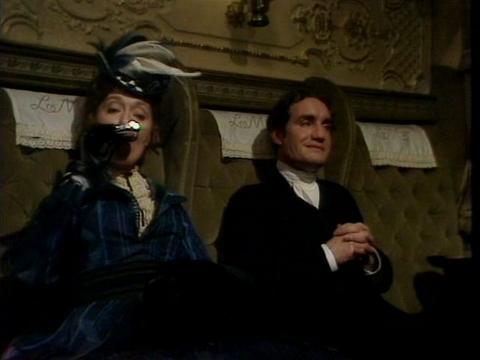
Mrs Carbuncle and Mr Emilius (Anthony Ainley) on train
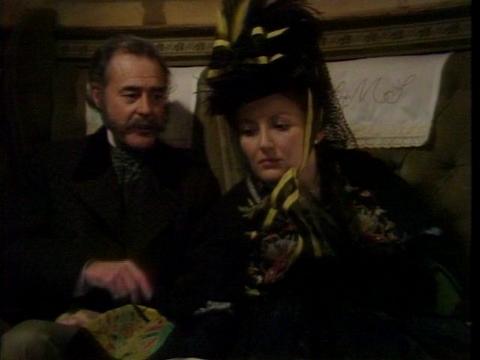
Lizzie has woken and starts with fear the diamonds are gone, Lord George (Terence Alexander) reassures her
To Jane’s revoiced idea they could sell the diamonds, and talk bout splitting up the stones, George says it’s impossible as they would be identified (in a later scene when this idea is again brought up by the two women, he says they might as well try to sell “the Taj Mahal”). Lizzie persists in insinuating flirting with him to his face as someone who is wild but will protect her as Byron’s Corsair does (she apparently does not know Byron has more than one and not all protect women); he grows irritated and replies: “You, milady, are a parasite just like the rest of us in here, so as one parasite to another, why shouldn’t I help myself to those diamonds. You’ve done nothing to earn them. They may not even be legally yours.” He is embarrassed by Lizzie’s (not so hypocritical overt clinging) and takes things one step at a time (“So far so good, milady” is his, the last line of this scene).
Scene 6) Carlisle Hotel, Lizzie’s bedroom. First Lizzie (she declares “Splendid” of the room when she walks in, and it is luxurious) and Mrs Carbuncle, then the servants with luggage and landlord, George and Emilius. If she’s worried about diamonds, George advises, to leave them downstairs with landlord, for he refuses to have them in his room, and while she at first clutches that idea, she as quickly declines. Mrs Carbuncle goes out talking to the landlord of the scrumptious meal she expects.
Episode 22: “Burglary:” Scene 7) Carlisle hotel, corridor and landing just outside Lizzie’s bedroom. Coming up and emerging from stairs, our principals are laughing, and it seems these people provide Lizzie with the heights of aspired enjoyment (“Oh what a jolly evening! What a shame that it all has to end so soon …”); so sad, parrots Mrs Carbuncle, but we will all be together in London at Hartfield Street (her place to which they are going), but it will not be the same says Lizzie because in Portray she could look at George with “the sea at his back and the wind in his hair” where he is an image “of Byron’s Corsair”! Like an ironic mother, Mrs Carbuncle suggests perhaps Corsairs are “heady people to have about one,” and Lizzie should rather “keep her mind on her business.” The scene ends on George and Lizzie left in front of the door together; he makes no attempt to kiss her or go in.
Scene 8) Carlisle hotel, Lizzie’s bedroom: Lizzie waltzes in humming a Strauss waltz, and another scene with Crabstick where we see Lizzie’s careless arrogance and disdain, rude dismissals of proferred small talk, and how Crabstick gets back by “sticking” her, and then giving her a powder meant to put Lizzie to sleep far more deeply than she suspects.
Scene 9) Carlisle hotel, corridor, thief seen ducking from George’s notice who is coming out of Jane’s room; George stops by Lizzie’s door, but thinks the better of it; Scene 10) Carlisle Hotel, once again inside Lizzie’s bedroom. (Continuation of Scene 8 with Crabstick). Again Crabstick sticks Lizzie, and Lizzie harsh in behavior; Lizzie ejects Crabstick, & locking door, tells Crabstick that she must knock to get in the following morning. Lizzie walks unsteadily (powders taking effect) and then we see her pray to God, in a meant-to-be absurd scene blessing the souls of mother, father, husband, and asking for God to “make it all right about my diamonds.” She puts hands on box. Grim irony; when the Part is funny, the humor includes a certain grimness.
Scene 11) Dumb show scene in corridor just outside Lizzie’s room again, where (much later?) we see thief with suitcase coming out again, and this working on two large gold handles on Lizzie’s door. (God was having no part of this.) All goes black. Scene 12) Carlisle Hotel, Lizzie’s bedroom, morning. Blackness becomes dissolved by opening curtain and we have the effect of a window and light floods through the gauzy curtain as Crabstick hurries over to wake “milady” and show Lizzie the broken-in door and safe gone. Crabstick heads for police and Lizzie sinks in distress into her pillows.
Scene 13) Phineas’s lodging. See transcript. This is the moving scene where Mary, heavily pregnant, in pain, not doing well, waits for Phineas to return home; she fixes the fire, and he comes in despairing. Patiently she picks up his bag but angers him with her offer of cheap porter; what is he working for anyway? He can’t help the poor. She appeals on the grounds of the baby, but he’s tired of that, and when she relents this one night, he is again irritated, but he relents when he sees her worn face and genuine decency and concern for him and for their child, and shows his love and worry for her health. Quite a contrast to the rest of 7:13. This leads into Palliser material where there is also genuine feeling.
Scene 14) Matching Priory. As in the opening of 6:12, Lady Glen and the Duke playing a game, this time it’s chess, and again Lady Glen is losing.
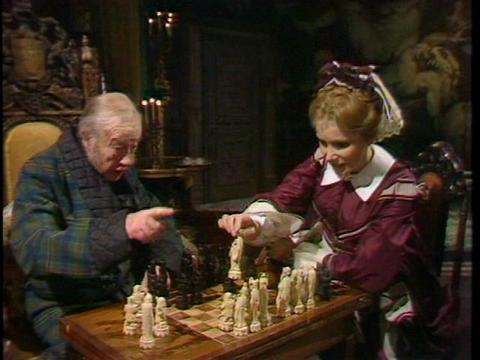
Duke of Omnium (Roland Culver) and Lady Glen (Susan Hampshire at another game
Both the Duke and Lady Glen are relieved when visitors, Madame Max and Plantagenet come in; the gossip they regale Lady Glen and the Duke with enables Raven to skip scenes so they tell us how the Lizzie’s box was found not to have had the diamonds in it, Lizzie is in London, and there has been no action against her “for failing to produce the necklace.” Palliser & Madame Max function here (as they will elsewhere) as clarifying voices of what we are to think morally, for when the aging Duke says he doesn’t understand what that means as the necklace was stolen, Palliser says “at least she’s not guilty of contempt of court,” for she could be considered “neglectful.” This statement provokes Lady Glen’s objection (which is Lizzie’s) that they are Lizzie’s “own,” to which Madame Max replies, “Ah! but the court has yet to decide that they are her diamonds.”
It’s in this scene Lady Glen remembers Lord Fawn and begins to think, poor Lizzie, no one is sticking by her and Duke voices the public’s assumptions that Lord George must’ve been the culprit. This idea is found in Trollope’s book where, as in the film, it upsets Lord George, and in Trollope’s novel, is also used to infer the stupidity of the public as reflected in newspapers and in their attitude towards the police).
Episode 23 “The Search:” Scene 15) Hartfield Street, the front room of Mrs Carbuncle’s establishment. A new character brought in: Sergeant Bunfit (James Cossins) and the film begins to take on the stylized mood of murder mysteries, for Cossins rightly plays his role as a half-parodic type. The dialogue quickly shows that Bunfit does not believe the diamonds were stolen in Carlisle, and his indifference to whether they are “heirlooms” or “paraphernaia” (which “the court is fretting about”); the question that’s important is, as summed up by Sir George: “In short, where are they?” The scene ends with George and Jane (we can call her) agreeing to let their things be searched, Emilius being let off (“we respects the cloth”) and Lizzie fainting away.
In the scene, Lord George plays a cynical representative of the same intelligence we find in Plantagenet Palliser, for after the officer patiently explains that had the diamonds been in the box, they would now have been heard of somewhere in the grapevine of police spies, and so now he comes back to Lizzie for another story (and suspects her hangers-on too), Lord George says: “On yes, you’re relying on the gossip of thieves and you’ve been disappointed.”
Scene 16) Matching Priory, another day, for Lady Glen is dressed in another outfit. She is reading one of Dolly Longestaffe’s letters aloud, but cannot make out a word and hands it to the Duke, who cannot and hands it to …. Madame Max who cannot make it out and hands it on to … Plantagenet Palliser who looks intently and says “uh … pressing it.” And Lady Glen interprets, “Oh! The police are not pressing it.” The delight the viewer feels at this set of unexpected reappearances testifies to how much we love being voyeurs and how these presences are a kind of splendid treat; we also enjoy that we are not held responsible for what’s happening (like these characters). It’s now that Lady Glen conceives her idea that Lizzie is having a hard time and needs support. Her seizing this opportunity shows how a thematic undergirding shapes characters; it’s a facet (unpleasant) of Lady Glen’s to want to show power; she is identifying too.
Scene 17) Hartfield Street, the front room again, also another day, for now Lizzie and Jane Carbuncle are dressed in different outfits. The gang of 4 (Lizzie, George, Jane, Mr Emilius) drink tea and discuss the situation (some of this taken from ED, Ch 20). Lord George upset at how he’s being treated as a suspect. Lizzie’s complacency and Lord George’s questions to her show he suspects she knows where the diamonds are; the ladies are going to the theater and Emilius to a dinner by a grateful parishioner so when Mrs Carbuncle and Emilius leave, (lines taken from ED, Ch 51, pp. 498-99) George pressures Lizzie by the door, and she promises to tell where they are if he doesn’t betray her.
Scene 18) Hartfield Street, Lizzie’s bedroom. The most interesting still is of Patience Crabstick looking out the window as Lizzie proceeds George in:
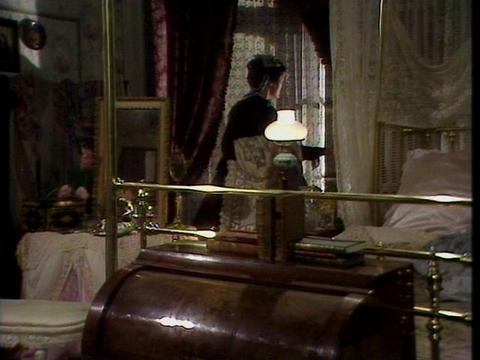
Patience Crabstick (Carolyn Jones) looking out window
The obvious interpretation is Crabstick is waiting for her accomplice (who will do the stealing of the diamonds), but I like also how we see she leads a life quite apart from Lizzie Eustace. In 6:12 we were shown her alone in Lizzie’s room, looking at the box, making the bed, and looking out the window, again an effort was made to present her as an individual and aware her accomplice was outside in the dark; but she made no motions which showed her active in her own life. Here she does, and from the side we can see she is without that hard expression she assumes in front of Lizzie. Then the interview between Lord George and Lizzie where he gives her the fatherly advice in a kindly tone to turn the diamonds in and tell the truth, but if not, then hide them in the desk or put them on her person.
This material is taken from Ch 51, and much changed, for in Trollope’s novel Lord George first turns “ferocious” in expression, and then attracted (for he finds her “pleasant to look at”), but by the scene’s end is cajoled and seduced into kissing her and promising he will “care” for her. Raven’s Lord George is a kindlier, warmer man, and is keeping his distance, and at the scene’s end merely kisses Lizzie’s hand gallantly, telling her to get ready to go to the “play,” or “Jane will cut your head off. The theatre’s the one thing apart from food she still cares for.” This is one of several comments by both Mrs Carbuncle and Lord George which reveal Lord George feels bad that Mrs Carbuncle has wearied of him. Raven’s George seems to care for Raven’s Jane.
Scene 19) On the coach on the way back from The Noble Jilt (a play by Trollope, one which retells the story of Alice Vavasour so he is having fun with stupidity and the egoistic readings of his play). This material is taken from Ch 52, pp. 506-7. In Trollope’s novel Lucinda Roanoke is there and the debate is really about Lucinda’s right to change her mind after agreeing to marry; in the film Jane is suddenly a self-satisfied hypocrite, offering stiff cant advice, while Lizzie is candid about her willingness to leave a “man at the altar” or “any time I found I didn’t like him.” Lizzie questions Mrs Carbuncle about her relationship with Lord George and Mrs C assures her they are just “old, old friends.” Lizzie sees the house is “surrounded by police,” and Sergeant Bunfit appears to tell them Lizzie’s desk has been stolen from her bedroom.
Scene 20) Hartfield Street, Lizzie’s bedroom. Lizzie again lies telling the Sergeant there was only a small amount of money in the desk; the Sergeant says this is patently improbable and she faints away again. Sergeant: “Getting to be rather a habit of hers.”
Episode 24: “Hittaway’s Plan:” Scene 21) Fawn court, dining room, breakfast. Everyone tapping on their eggs with forks. The characterization of Mrs Clara Hittaway (Penelope Keith), Lord and his mother, Lady Fawn (Madeleine Christie) is a dramatic distillation of many different scenes in ED where Mrs Hittaway bullies and is adament over how Fawn is disgracing himself, he must break the engagement bring Andy Gowran to England for evidence of Lizzie’s affair with Frank.
This memorable scene where Keith plays a type comic actress she has played in situation comedies has her talking very loud and pointedly. She insists Lord Fawn break off his engagement with Lady Eustace, and marry money to support his mother, Fawn Court and 7 unmarried sisters; she fills us in with more information on what has happened to Lizzie since the previous scene: “since the second robbery, she refuses to assist the police” and (as we viewers know though not the Fawns) “is living near Shepherd Street with a highly peculiar woman.”
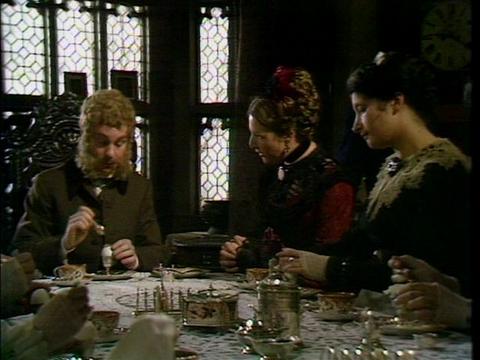
Clara scolds Lord Fawn amid the eggs
Episode 25: “Fawn’s Attempt:” Scene 23) Hartfield Street, Lizzie’s bedroom, Lizzie in bed. Raven takes the scene setting of Ch 53 (“Lizzie’s Sick-room”) and changes the nature of the dialogue of Frank and Lizzie so it begins with Mr Emilius reading from the Song of Songs very sexily (an elaboration of a suggested erotic between them in Ch 66, p 639). A split screen suggests Lizzie is enthralled by this:
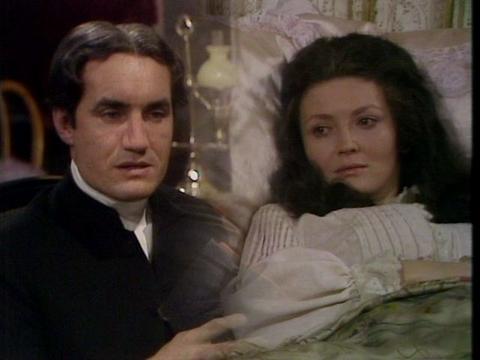
Erotic moment as Mr Emilius reads Bible to Lizzie (split screen)
Raven then places into the scene Lady Glen’s visit and support of Lady Eustace (dramatized in Trollope in Ch 54, “I suppose I may say a word,” pp. 534-35, cited by Clara Hittaway, Ch 60, p 579)
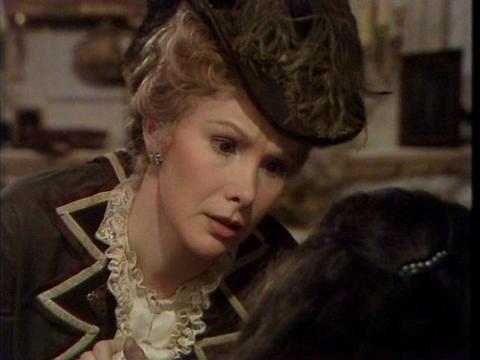
Lady Glencora gulled
Finally, Raven replaces the dialogue between Frank and herself Trollope wrote: Trollope’s Frank shows distrust of what she has been doing with Lord George, warns Lizzie against Emilius, and refuses to take Lizzie’s offer of her in marriage. In Raven’s scene the pair dissolve into love-making.
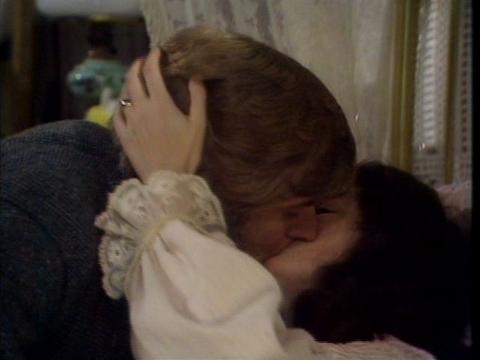
Lizzie and Frank falling into bed
Scene 23) Fawn court, dining room., perhaps luncheon? Now Clara confides her plan for Lord Fawn to marry Madame Max. (There is one paragraph early in ED where the narrator tells us Lord Fawn proposed to Madame Max three times, Ch 9, p. 116). Lord Fawn points out that Madame Max is foreign, in trade and he dislikes Madame Max and she him, but Mrs Hittaway retorts only the “trade” is foreign; she is accepted by the highest English circles; and as to likes and dislikes, Frederick mustn’t be “frivolous” since “the matter is too grave for the obtrusion of your personal preferences.” The money is there and desperately needed. A parody of the idea that if you keep asking a woman she will eventually yield is her last argument.
Scene 24) Madame Max’s apartment in London; one we’ve not seen for several episodes, but it’s familiar. She is (as before) playing the piano. Fawn makes an awkward and obviously insincere business of beginning courtship, hurrying immediately into his proposal.
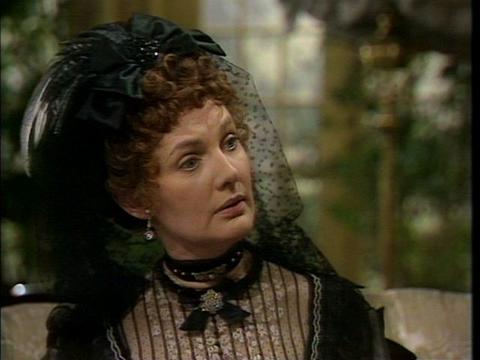
Madame Max (Barbara Murray) as yet puzzled by this extraordinary visit of a man who hitherto had treated her as beneath him
As I wrote above, the basis for this & an ensuing scene in the next part is the above paragraph in ED where the narrator tells us Lord Fawn proposed to Madame Max three times (Ch 9, p. 116). Ravan has added Lady Glencora’s pressuring of Fawn at a party Lady Glen held (Ch 56, pp. 540-41), because much to Madame Max’s relief, Lady Glen barges in with her packages (from shopping) and then proceeds to bully Fawn and use first the Duke and then her husband’s power (about which he preens) to frighten him.
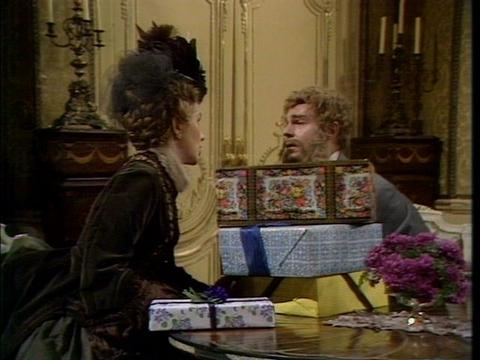
Lady Glen and Lord Fawn as clowns on either side of a Christmas-like package
This moment is the nadir of the series for me. In 7:14 Raven will make yet a third scene from the 1 paragraph, but in this later one Madame Max turns on Fawn and asks him about his money, property and so on and it becomes a satire with some serious themes (about how marriage is conducted). Once before Lady Glen had barged in, the previous time with the very young Planty just as the Duke was pressuring Madame Max to be his mistress, and she in the position of not wanting to insult him (she needs his favor to socialize in this upper class world), but not wanting to say yes for that would cut her off from all that she likes in it (friendships with powerful intelligent enough people in the know). By the end Lady Glen has bullied Lord Fawn into agreeing to go to Lucy, which prepares us for the last scene of the Part.
Scene 25) Hartfield Street, the front room. This scene again combines motifs of many in Trollope’s ED. We have Lizzie’s frankly-stated desire to humiliate Lord Fawn into asking her again so she can triumph. There are details from his foolishly writing a letter with much truth in it which gives her a handle (Trollope in his letters in the novels repeatedly shows us how differently human reality operates when words are written down rather than spoken, Ch 67, pp. 647-49). And the scene ends on the exposure of Lizzie which frees Fawn. In Trollope’s novel, the Major is all politeness (Ch 68, pp. 653-64), some time after which (and the court scene where Lizzie is said to have triumphed), Fawn writes her one of these notes in the third person that cuts off communication and she rants at him with disdain and scorn (but he has won).
In the scene Lizzie is posturing on her sofa chair as if she were sick; Lord Fawn comes in and after an initial resistance on his part where he stands up for himself (the engagement was to continue only on the condition she gave the diamonds to the court), Lizzie need only refer to her great friends, Lady Glen and the Duke, and he’s on his knees grovelling before her to accept him once again. She has the delight of triumphing over him. Alas, the Sergeant comes in to say Patience Crabstick is in custody and will cooperate, and they will soon know all. Lizzie therefore must stay in London; what is implied is enough for Fawn to be able to say to her sudden craven cringing behavior before him, why not go to your friend, The Duke of Omnium ….
The anamnesic music begins and, for once there is a gesture from Lizzie Eustace meant to make us sympathize with her. Sarah Badel throws a blanket over her head, an archetypal gesture often given to women in distress in movies: let me go in a corner and hide.
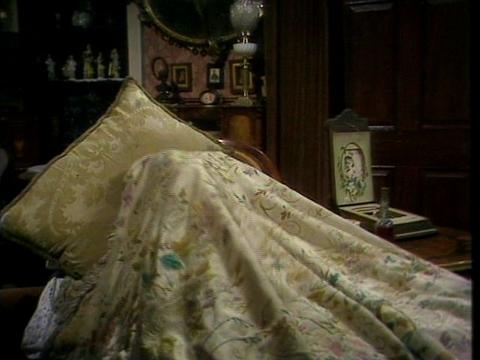
Lizzie hiding
So much for the one part in the series where the central protagonist is a woman.
See various links and a concise summary of 1:1-3:6, 4:7, 4:8, 5:9, 5:10, 6:11, and 6:12.
Ellen
--
Posted by: Ellen
* * *
Comment
commenting closed for this article
